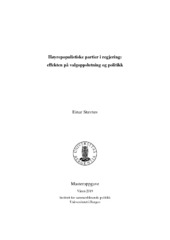Høyrepopulistiske partier i regjering: effekten på valgoppslutning og politikk
Master thesis
Permanent lenke
https://hdl.handle.net/1956/20298Utgivelsesdato
2019-06-21Metadata
Vis full innførselSamlinger
- Master theses [111]
Sammendrag
In many European countries right-wing populist parties have experienced a dramatic rise in electoral success, and since the 1970s no other party family have seen the same rise in electoral success as the parties which constitutes the right-wing populist party family. This rise in electoral success for the right-wing populist parties have also resulted in government participation for a number of these parties, something this master thesis wants to focus on. The research question is as follows: How does government participation effect the electoral success of right-wing populist parties, and what role does policy moderation play as an intermediate variable? By using «the inclusion moderation thesis», the argument presented is that government participation has a negative effect on the electoral success of right-wing populist partier because these parties are forced to moderate their right-wing populist policies when they join government. This moderation results in a negative «cost of governing» because the people who voted for them are disappointed that they did not maintain the right-wing populist policies that they promoted while in opposition. Based on a data from a range of European countries for the period from 1990 until 2018 this thesis finds that there exists a considerable «cost of governing» when right-wing populist parties join government. On the other hand, there is no evidence that leads to the conclusion that this cost is a result of moderation. If fact, change in policies seems not to have a significant effect on the electoral success of right-wing populist parties. This leads the thesis to conclude that the existing «cost of governing» must have a different explanation than policy moderation.
